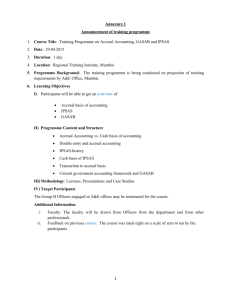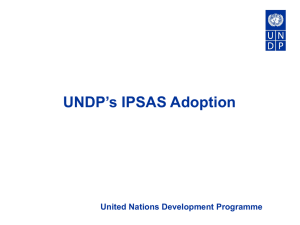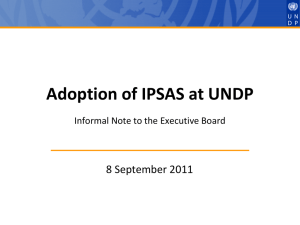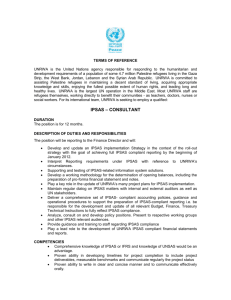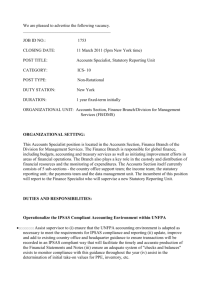UNFPA Revenue Recognition & General Framework
advertisement
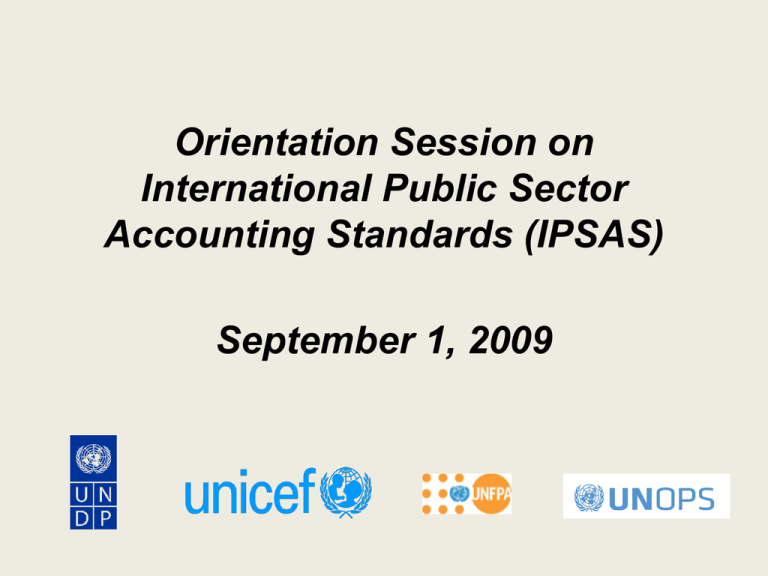
Orientation Session on International Public Sector Accounting Standards (IPSAS) September 1, 2009 What is IPSAS and Why Adopt It UN Board of Auditors considers the implementation IPSAS as the single most important aspect in the UNs Management Reform (letter to the Secretary General, December 2008) What is IPSAS: • set of independently developed accounting standards considered as best practice for the public sector organizations • Used to define the presentation of financial statements Why IPSAS: • Provide consistent application of accounting principles throughout the UN system • UNSAS unable to keep pace with changing accounting developments or methodologies • Improves accountability and transparency through IPSAS compliant financial statements What is IPSAS and Why Adopt It Why IPSAS (continue): • Improves the extent to which financial policies, regulations and rules, business practices and procedures respond to the needs of the organization What is IPSAS and Why Adopt It International Public Sector Accounting Standards (IPSAS) – IPSAS « target » is not a specific country or international organization. IPSAS is « worldwide ». – At least 70 countries have either adopted or are in process of adopting IPSAS for part or all of their public sectors – Most of the international organizations are taking IPSAS as a reference What is IPSAS and Why Adopt It International Public Sector Accounting Standards (IPSAS) – IPSAS is developed by Public Sector for Public Sector. – IPSAS is based on IFRS (accounting standards for private sector) but is adapted (when necessary) to Public sector specificities – Examples of specificities are: taxes (for governments), contributions from member countries (for international organization) or grants What is IPSAS and Why Adopt It International Public Sector Accounting Standards (IPSAS) – IPSAS is focused on accounting and is not for budget. Similar to IPSAS, accounting standards are for example US GAAP for US companies, IFRS for European companies – IPSAS has 26 standards (2 volumes, 1200 pages) • IPSAS 1. Presentation of Financial Statements • IPSAS 15. & IAS 39 Financial Instruments • IPSAS 2. Cash Flow Statements • IPSAS 16. Investment property • IPSAS 3. Accounting Policies, Changes in Accounting Estimates and Errors • IPSAS 17. Property, plant & Equipment • IPSAS 4. The effects of changes in Foreign Exchange rates • IPSAS 5. Borrowing costs • IPSAS 6. Consolidated Financial Statements and Accounting for Controlled Entities • IPSAS 7. Investments in associates • IPSAS 8. Financial reporting in Joint Ventures • IPSAS 9. Revenue from Exchange Transactions • IPSAS 18. Segment Reporting • IPSAS 19. Provisions, contingent liabilities & contingent assets • IPSAS 20. Related party disclosures • IPSAS 21. Impairment of Non Cash-generating assets • IPSAS 22. Disclosure of financial information about the general government sector • IPSAS 23. revenue from non-exchange transactions • IPSAS 10. Financial Reporting in Hyperinflationary Economies • IPSAS 24 statements • IPSAS 11. Construction contract • IPSAS 25 Employee benefits • IPSAS 12 Inventories • IPSAS 26 Impairment of Cash-generating assets • IPSAS 13 Leases • IAS 38 Intangible Assets • IPSAS 14 Events After the Reporting Date Presentation of budget information in financial Standard Setting Process NOTES: International Federation of Accountants (IFAC) International Accounting Standards Board (IASB) International Accounting Standards (IAS/IFRS) International Public Sector Accounting Standards Board (IPSASB) 1. The IASB is an independent accounting standard setting body. It is committed to developing a single set of global accounting standards. The IASB cooperates with national standard setting bodies to achieve convergence in accounting standards around the world. 2. The International Federation of Accountants (IFAC) is the global organization of the accounting profession. One of its key missions is to establish and promote adherence to high quality standards, such as IPSAS. 3. The IPSASB is one of many boards of the IFAC. It focuses on the accounting and financial reporting needs of the public sector – including national and regional governments, government related agencies and the constituencies that they serve. International Public Sector Accounting Standards (IPSAS) United Nations Systemwide Organizations IPSAS Project Governance Structure & Working Groups Chief Executive Board High Level Committee on Management IPSAS Project Governance Structure Finance and Budget Network Task Force – Accounting Standards [represented by all UN Organizations] IPSAS Steering Committee (system wide) [Membership: UN, UNDP, UNICEF, UNHCR, WFP, WHO, FOA, IAEA, UNIDO & PSASB] UN System-Wide IPSAS Project Team NY Focus Group [UN, UNDP, UNFPA, UNICEF, UNOPS, PAHO, ICAO] Geneva, Vienna and Rome Focus Groups Working Groups Application of IPSAS in the UN IPSAS Organization Specific UN System Wide Deals with concepts, definitions and accounting principles UN System Wide Approved Policies and Guidance Accounting and Finance •Accounting Manuals • Further decisions on accounting policies •Chart of accounts and respective “posting rules” (the debits and credits) •PPE Management & oversight •Detailed Procedures, Guidelines and Manuals for PPE management Configured/Integrated IT systems: fixed asset register, procurement module (supply chain) & finance module Presentation of Material Presentation of Material Topic Welcoming Remarks Introduction and Delivery Principle Revenue Recognition Fixed Assets [break] Inventory Employee Benefits Presentation of Financial Statements Closing Remarks Time 3:00 – 3:15 (15 min) 3:15 – 3:30 (15 min) 3:30 – 4:00 (30 min) 4:00 – 4:30 (30 min) 4:30 – 4:45 (15 min) 4:45 – 5:05 (20 min) 5:05 – 5:25 (20 min) 5:25 – 5:55 (30 min) Organization UNFPA UNFPA UNFPA UNOPS Presenter Subhash Gupta Jim Notaro Uday Dayal Vitaly Vanshelboim UNICEF UNDP UNDP Warwick White Helen Hall Helen Hall Jim Notaro Delivery Principle for Good and Services Under UNSAS - expenditures are recorded when a PO for goods or a contract for services is issued. Under IPSAS - expenses are recorded when goods are received or consumed, where control has been transferred or services rendered. - effectively eliminates encumbrances accounting - more in line with results based management - tightens procurement practices - less POs brought forward to following year

